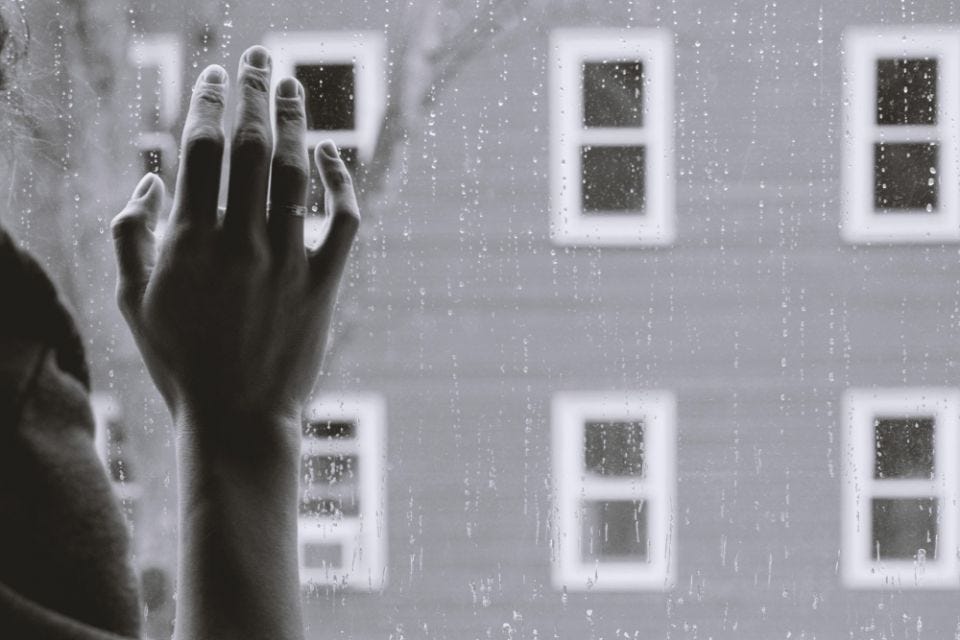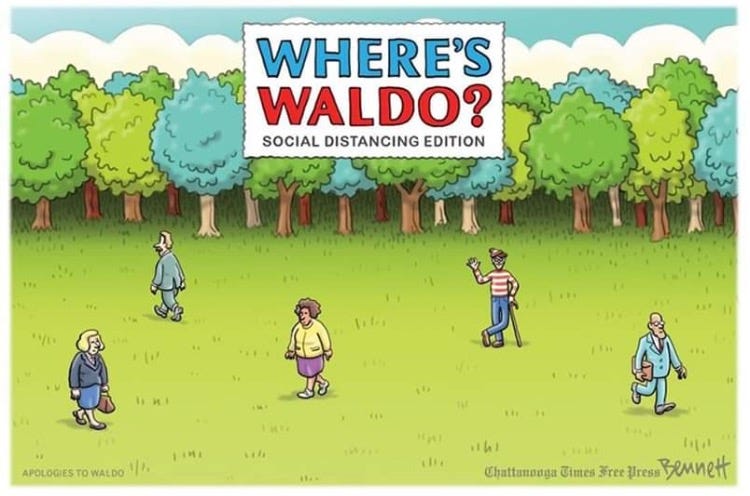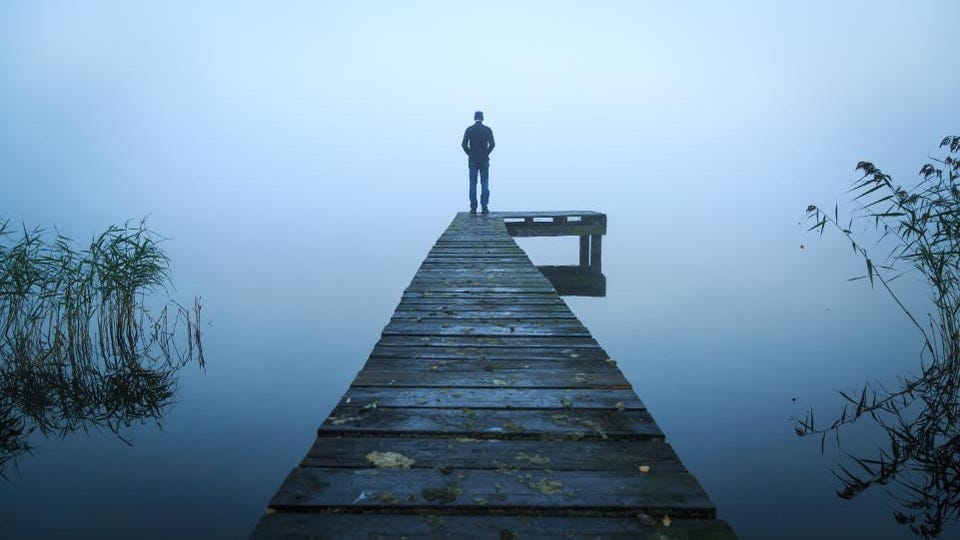GREAT LOVE & GREAT SUFFERING
Fear, panic, hope, euphoria, despair, numbness, boredom, confusion, terror, rage, relief, regret, obsession, lostness, love...
These are just some of the emotions I’ve felt since the world flipped upside down due to the you-know-what. I can also add 'grief' when I heard of the passing of the great New York theater actor Mark Blum who was married to Janet Zarish, one of my acting teachers from NYU. As I wrote on Twitter, Mark was exactly the kind of actor I aspired to be when I was in drama school: constantly employed, deeply respected, total mensch. I shed my first real tears over this thing about an hour after learning of his death.
In Chinese medicine it’s said that the lungs are where we store our grief. I can’t stop thinking about that given that life as we knew it has been ground to a halt by a virus which most notably attacks the respiratory system. For so long I’ve thought the world could use a good cry, that the brutality of life in the modern era was backlogging so much grief inside each of us. Maybe that’s why we never wanted to pause, the unspoken fear that once we stopped moving we’d have to confront the immensity of our sorrow.
And now here we are, with a sickness in our lungs.
In Susan Sontag’s essay “Illness As Metaphor” she warns (correctly, I think) against moralizing sickness and disease. I don’t mean to impose a moral function on this virus in any way, which cares not at all about one's race, religion, class, gender, politics, etc. But I do believe there is much to be learned in this moment beyond the scientific and medical. David Kessler co-wrote "On Grief and Grieving" with Elisabeth Kübler-Ross in which they identified the now-famous "Five Stages of Loss." In his new book he outlines what he calls the sixth stage of grief: Meaning. (He recently did a fantastic and moving interview with the Harvard Business Review: That Discomfort You’re Feeling Is Grief.)
Sometimes things simply happen and imposing a meaning upon them can not only be counterproductive but downright cruel. That said, I understand what Kessler is saying. On the other side of grief, I've found, lies a wonderful opportunity to contextualize our struggle and loss. Among the gifts are new insights, fresh perspectives, and the knowledge that we are stronger than we'd suspected ourselves to be. As Friedrich Nietzsche famously put it: "He who has a why to live for can bear almost any how."

For me this pandemic has been a great teacher of humility, a stark reminder that I don’t know much and I’m in control of far less than I’d like to believe. So much of my writing in this space has been about upended expectations, the gifts of change and uncertainty, granting oneself the space and permission to feel a range of appropriate and often uncomfortable emotions. Now that this new reality is very much here I find myself having to practice what I preach. I’ll admit that I’m succeeding and failing in equal measure.
Not that there’s a reliable yardstick to measure one’s success in the current climate. We’re very much off the grid here and everyone has to kind of set their own course curriculum. I’m not one of those people who believe I have to write my “King Lear” while in quarantine, attractive as that fantasy may be. If I can simply stay put, be there for friends and family, write a few songs, and stay just north of sane I’ll declare victory.
I have noted in myself a kind of reflexive optimism (i.e. “This is going to be okay,” “We’ll get through this,”) of which I’m becoming suspicious. Do I just feel that way because I’ve been inoculated by my privilege? Surely this is going to be calamitous for many people – far beyond the sick and the dying – and I don’t want to turn a blind eye toward that suffering: the suddenly unemployed and homeless, the relapsing addict and those that love them, those trapped in abusive and unsafe homes, etc.
It feels like this moment is asking me to grow up, to stop relying on false-hope granting platitudes and accept that pain, suffering, and grief are part of the birthright of being a human being. I say that with the full knowledge and deep belief that love, joy, laughter, and art are also part of that birthright. Light and shadow are inextricably bound up with each other and it’s naïve to think that darkness can be vanquished or banished in favor of everlasting light. That’s magical thinking of a kind to which I refuse to subscribe.
All that said, I want to do my part to ensure that love is at least in the lead, that the moral arc does indeed bend towards justice. In this moment, first and foremost, that means staying home.
There’s something so moving about the millions of people taking the quarantine seriously because it signals a deep belief in community and a respect for the most vulnerable among us. I look at staying in as a civic responsibility, a powerful statement that I am a member of a community, a resident of a state, and a citizen of a country. My life is not for me and me alone.

Pandemics are a recurring theme throughout human history. They offer a startling reminder of our fragility and interconnectedness. When sickness sweeps through the land we see very quickly how much we’d taken for granted. How asleep we’ve been. We’ve been going going going for so long and in that frenzied pace our inner life – the source of all spiritual gold – grows dim and inaccessible. Life becomes about the next chore, task, achievement, diversion, or addictive fix. But suddenly, as if we received a non-negotiable order from on high, we have to stop. No more running around, no more chasing the dragon of business, achievement and validation.
An enforced time-out is upon us. It’s not something most of us consciously asked for but it’s here.
Most of the world’s great religions teach of the inevitability of suffering and instruct us to meet the ever-changing world with acceptance and surrender. It reminds me of my favorite passage from the Tao Te Ching, which advises us to be supple and flexible like a new young branch, which can bend and retain its former shape, unlike the rigid old twig which snaps easily. (Consider the word “snap,” so often invoked to describe people who simply lose it and commit all manner of atrocities.)
When something in my life is nonnegotiable, with no wiggle room or option to opt out, I can be sure that's it on the spiritual curriculum. I have no choice but to rise up to meet the challenge of whatever I'm facing. And the greatest challenge I'm currently facing is myself. Or more specifically, my mind.
Even with the first-hand knowledge of all the positive benefits it brings to my life, I still resist meditating. Sometimes there's something almost frightening about closing my eyes, unhooking myself from the world of form, and confronting the dark spacious emptiness of my own psyche. Actually, strike that. ‘Emptiness’ is the wrong word. My mind is filled with myriad competing voices vying for my attention. To get to the promised land of ‘no-thought’ or transcendence, I have to wade through a thousand thickets: confusion, hunger, ache, distraction, restlessness, regret, neediness, neuroses.
But it’s the arc of every great fairy tale, right? We leave home (the comfortable, the familiar) to journey into the dark wood. Only there – in the terrifying shadow – are we able to confront our fears and push past our limitations. In that battle we are transformed so that when we return home, we return home changed, upgraded, and bearing gifts for those we love (In a neat twist, our actual homes are the current dark wood.)
The only way I can get through something like this is to view it in these mythic dimensions, to understand that this supremely odd world-wide moment we’re all sharing provides us with a divine opportunity to see what we’re really made of. To transform our lives and our world for the better. Or as Francis Weller recently put it in his newsletter, "This is a season of remembering the ancient rhythms of soul. It is a time to become immense."
Richard Rohr says there are only two ways we really learn: Great Love and Great Suffering. I see evidence of both everywhere I look. Which can only mean one thing: There must be a lot of learning going on at the moment.

I started my own YouTube channel and here's three songs I posted, one I wrote myself and two I wrote with the great Molly Tuttle in Nashville.
Apocalyptic Love Song
I Failed Now I'm Free
Love Never Fails
I loved hearing my friend Terces Engelhart on Katie Dalebout's 'Let It Out' podcast, a really nourishing inspiring conversation.
Here's an interview I did with Collider about "Hunters"
Two videos that have brought me some joy: The Rolling Stones "Far Away Eyes" & Haim "The Steps"
Oh and this crushes me: Sheila Atim performing Bob Dylan's "Tight Connection To My Heart" from the musical "Girl From The North Country."
This is a really cool thing from choreographer Annie-B Parson and Believer Magazine: Six Verbs Dance in the Age of Corona,
I loved reading this piece on Alan Alda, who's aging very well in more ways than one.
This is good: The Happiness Lab with Dr. Laurie Santos: Beat Your Isolation Loneliness. And this interview with the aptly named Larry Brilliant calmed me down a bit.
Worth a read if anxiety is getting the best of you: 10 Positive Updates on the Cover 19 Outbreaks From Around The World.
I'm loving Waxahatchee's new album "Saint Cloud" so much. Really enjoyed watching her and Kevin Morby play a couple tunes together.
Joe Pernice is a songwriter I've long admired. He's been doing a series of Barry Manilow covers and they're delightful. Here's "Mandy."
This by Claire Messud is beautiful: The Time for Art Is Now
A guaranteed mood-elevator: Miumiu is a six-year-old guitarist based in Nanjing, China. Here she is performing "I Wish You Love."
My pal Betty Gilpin has quickly become the most hilariously quotable actor in all of show business. This interview with her is fantastic.

This beautiful poem by Lynn Ungar made the rounds in mid-March and I thought it worth posting here:
Pandemic
What if you thought of it
as the Jews consider the Sabbath —
the most sacred of times?
Cease from travel.
Cease from buying and selling.
Give up, just for now,
on trying to make the world
different than it is.
Sing. Pray. Touch only those
to whom you commit your life.
Center down.
And when your body has become still,
reach out with your heart.
Know that we are connected
in ways that are terrifying and beautiful.
(You could hardly deny it now.)
Know that our lives
are in one another’s hands.
(Surely, that has come clear.)
Do not reach out your hands.
Reach out your heart.
Reach out your words.
Reach out all the tendrils
of compassion that move, invisibly,
where we cannot touch.
Promise this world your love —
for better or for worse,
in sickness and in health,
so long as we all shall live.
— Lynn Ungar 3/11/20
****
As always, if you're enjoying these please spread the word (people can sign up here) And if you're new to these check out past Museletters.
Stay safe! Stay home! JR




